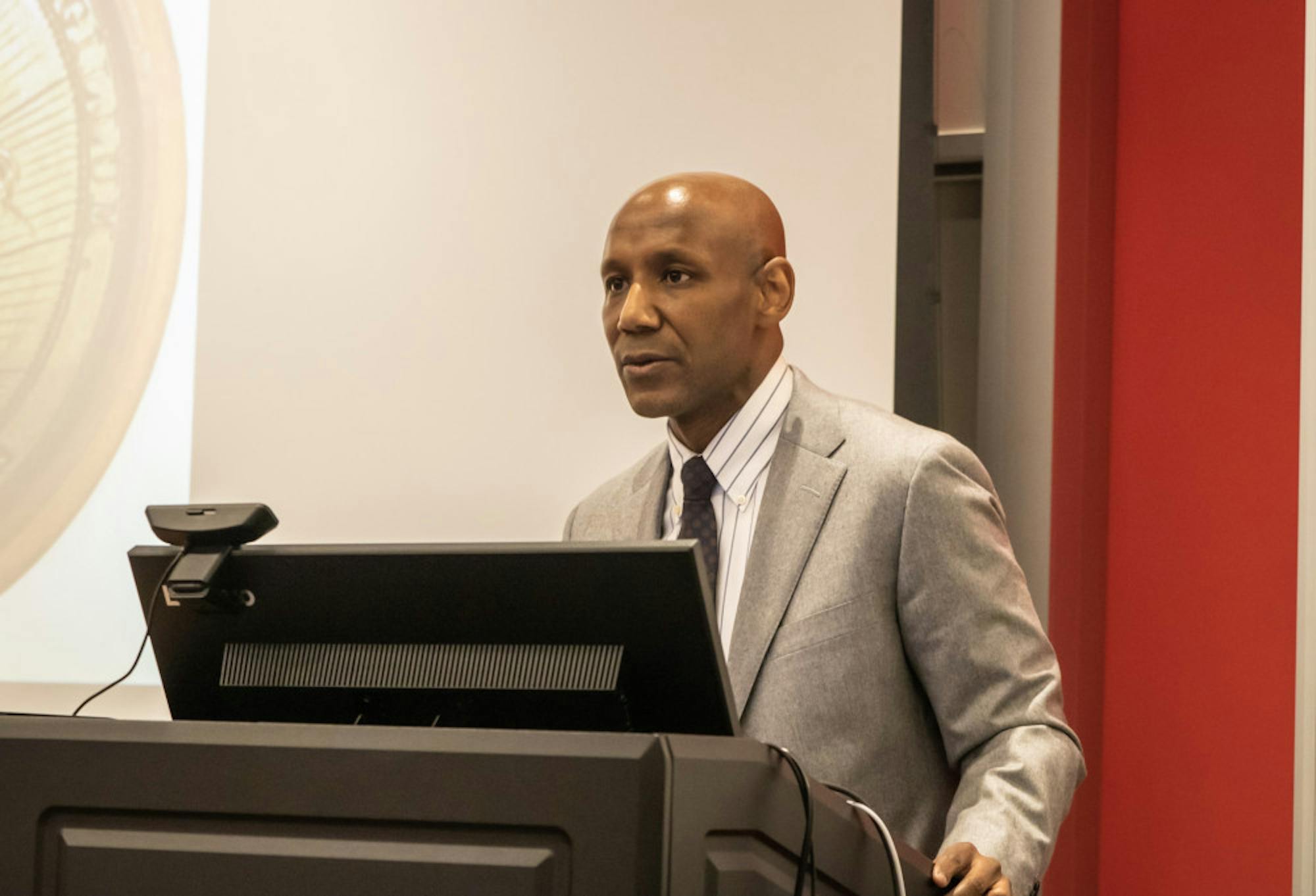Professor Craig Wilder spoke about his work to uncover higher education’s connection to the slave economy on April 12 at the inaugural event for the Slavery, Colonialism, and Their Legacies at Tufts project. The event was co-sponsored by the Center for the Humanities at Tufts, the Center for the Study of Race and Democracy and the Office of the Provost.
“Today’s lecture is part of a larger effort to examine the history of slavery and colonialism and their lasting [effects] on higher education across America,” University President Anthony Monaco said in his introduction. “This work is difficult but necessary as a step in our university-wide commitment to become an anti-racist institution.”
Wilder is the Barton L. Weller Professor of History at Massachusetts Institute of Technology and the author of multiple books, including his most recent publication in 2013, “Ebony & Ivy: Race, Slavery, and the Troubled History of America’s Universities.”
“He’s a historian of American institutions and ideas,” Caroline Genco, provost and interim senior vice president, said. “His work has really had a profound effect on higher education, pop culture … scholarship, history and society at large as we challenge our understanding of how elite institutions have been built.”
Wilder began the talk, titled “Knickerbocker Renaissance: Slavery & Education,” by telling the story of how the education system in Flatbush, N.Y., was able to flourish due to the expansion of slavery during the 17th and 18th centuries.
“The escalation of the African slave trade and the spread of plantation slavery integrated regional and local markets, transforming elementary and advanced education in the Northern colonies,” Wilder said. “Wealth from the slave economy stabilized, finally, the earliest British American colleges … and brought a major extension of higher education in its wake.”
Wilder mentioned that Erasmus Hall, in New York City, was founded in Flatbush, a town with a remarkably large population of enslaved persons. He said that a 1786 census, taken just after the first meeting of Erasmus’ founders, found that 46% of Flatbush’s population were enslaved people. Wilder called Flatbush “the gravitational center” of New York’s slave economy and by extension, the center of the slave economy of the entire Northeast.
“Key sites in the development of American slavery were also, in fact, key sites in the history of American education,” Wilder said. “Erasmus’ charter trustees owned more than 100 human beings, including at least a quarter of all the Black people in town, and they came from the most prominent slave-owning families in Kings County and the state.”
Wilder explained that colleges and academies were reliant on the slave economy in many more ways than they are typically considered to have been.
“To put it a little bit differently, the presence of enslaved people on college campuses is an evocative but misleading measure of the academies’ reliance upon slavery,” he said. “Few unions actually rival the intimacy of slavery and education.”
After Wilder delivered his prepared remarks, there was a Q&A section led by Kendra Field and Kerri Greenidge, professors of history and race, colonialism, and diaspora studies. Field and Greenidge established the African American Trail Project at Tufts and are co-directors of the Center for the Study of Race and Democracy. Field and Greenidge took turns asking Wilder questions about his work and its implications for universities such as Tufts and MIT.
In response to a question about how the trajectory of research has changed over time, Wilder said that his recent work has grown from questions of why certain minority groups, such as Native Americans, were allowed to attend certain universities before others, namely Black Americans.
“[My findings] suggested, actually, that colleges have a kind of role in shaping racial civilization that I hadn’t thought of before,” Wilder said. “They weren’t these innocent institutions that sat in the background and just observed, but they were actively participating in shaping racial culture.”
Wilder was also asked about challenging the mythologies of racial progressivism that universities often have surrounding their founding.
“MIT wrapped itself in a sort of abolitionist myth: that it was founded in Boston long after slavery ended, and therefore, it was effectively an abolitionist school,” he said. “It would be difficult for us to have more ties to slavery. We were founded by a Virginia slave owner who spent most of his career as a professor … [and] as a slave owner who used, in fact, an enslaved man in his research.”
He also spoke about the field of engineering’s deep connections to slavery.
“The great engineering project of the 18th century is the slave ship,” Wilder said. “The history of engineering has always been a history of slavery, and so we’re wrestling with that.”
Field, Greenidge and Wilder concluded the talk by discussing the important role that students play in uncovering the racial histories of their universities.
“For 20 years, student activism … has forced campuses to deal with their pasts,” Wilder said. “From Georgetown to Brown to MIT, now, student activism has been transformative.”
In addition to activism, he spoke about the large role that undergraduate research plays in his work and the power of students researching their own institutions.
“[One reason I emphasized undergraduate research] is purely political. It’s hard to argue against Williams students studying the history of Williams for Williams,” Wilder said. “If you don’t like that idea, you know, I dare you to say it out loud.”






